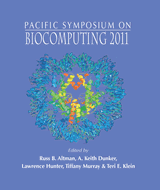The Reference Human Genome Demonstrates High Risk of Type 1 Diabetes and Other Disorders
Rong Chen, Atul J. Butte
Department of Pediatrics, Stanford University School of Medicine Stanford, CA 94305-5479, USA
Email: abutte@stanford.edu
Pacific Symposium on Biocomputing 16:231-242(2011)

Abstract
Personal genome resequencing has provided promising lead to personalized medicine. However, due to the limited samples and the lack of case/control design, current interpretation of personal genome sequences has been mainly focused on the identification and functional annotation of the DNA variants that are different from the reference genome. The reference genome was deduced from a collection of DNAs from anonymous individuals, some of whom might be carriers of disease risk alleles. We queried the reference genome against a large high-quality disease-SNP association database and found 3,556 disease-susceptible variants, including 15 rare variants. We assessed the likelihood ratio for risk for the reference genome on 104 diseases and found high risk for type 1 diabetes (T1D) and hypertension. We further demonstrated that the risk of T1D was significantly higher in the reference genome than those in a healthy patient with a whole human genome sequence. We found that the high T1D risk was mainly driven by a R260W mutation in PTPN22 in the reference genome. Therefore, we recommend that the disease-susceptible variants in the reference genome should be taken into consideration and future genome sequences should be interpreted with curated and predicted disease-susceptible loci to assess personal disease risk.
[Full-Text PDF] [PSB Home Page]